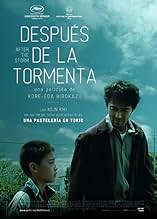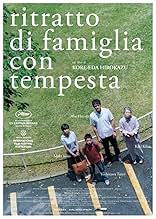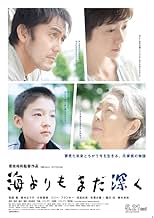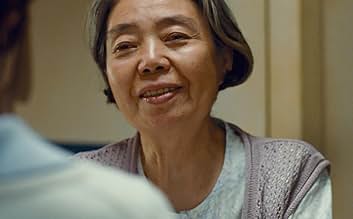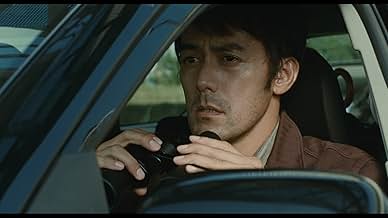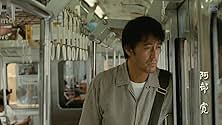IMDb RATING
7.4/10
13K
YOUR RATING
After the death of his father, a private detective struggles to find child support money and reconnect with his son and ex-wife.After the death of his father, a private detective struggles to find child support money and reconnect with his son and ex-wife.After the death of his father, a private detective struggles to find child support money and reconnect with his son and ex-wife.
- Awards
- 2 wins & 13 nominations total
Storyline
Did you know
- TriviaAlbeit released later, this film wrapped earlier than Koreeda's previous film Our Little Sister (2015). The month-and-a-half filming of After the Storm took place starting in May 2014 in between the production of Our Little Sister, which was shot throughout a year.
- Quotes
Shinoda Yoshiko: I wonder why it is that men can't love the present. Either they just keep chasing whatever it is they've lost... or they keep dreaming beyond their reach.
- ConnectionsReferences My Neighbor Totoro (1988)
- SoundtracksShinkokyû
Music and lyrics by Takashi Nagazumi
Performed by Hanaregumi
Courtesy of Victor Records and Speedstar Records
Featured review
In a relatively short time span, I've seen three films by Hirokazu Kore-Eda, and I'm planning to see many more. It seems most of his work is focused on family relations, and his films are touching, heartfelt real life dramas. The raw material for Kore-Eda's films are emotions, and the ways his protagonists express them in words and by their behaviour.
Like the two other films I've seen ('Our Little Sister' and 'Like Father, Like Son'), 'After the Storm' deals with parents, children, grandchildren and siblings. In this case, the central character is a divorced writer with financial problems, who has taken a job as a private detective to make ends meet. To keep up appearances, he pretends the job is a way of doing research for a new novel, but everyone knows there is no book.
His young son is very fond of his grandma, so they go visit her. But typhoon number 24 is approaching fast, and when the writer's ex-wife comes to the apartment to pick up the boy, the bad weather conditions prevent them from going home. They have to spend the night at the grandmother's house, just as if they were a normal family. And in a way, they almost are, during that one special night. After the storm, everything has returned to normal, except that the four of them are closer than they were before. The last shot is full of symbolism: the sun shines, but several broken and abandoned umbrellas are the witnesses of the stormy night.
It takes superior film making skills to turn such a story into a good movie. The emotions have to be measured out with care, in order to prevent it from turning into a tearjerker. The dialogue has to be natural, but at the same time not superficial. And the actors have to be completely believable. Just leave it to Kore-Eda: every scene is a joy to watch. It's those little things that make his characters so real: when his mother starts pleading him to stay the night, the writer says: oh, mother, please don't use this voice like you're almost dying. These are exactly the things mothers and sons say to each other, with a mix of affection and irritation.
The director also gives little hints and references which you only fully understand after a while. At the very beginning, the writer's mother remarks that a neighbour has moved to a bigger house. Only much later we learn that this has always been her own dream, and that she's tired of her own tiny apartment. I think it takes a second viewing to get all the tiny hints sprinkled throughout the story.
Are we what we hoped to be? And what was it exactly we hoped to be? Those are the questions 'After the Storm' deals with. There are no clear cut answers. But thinking about the questions makes this film worthwhile.
Like the two other films I've seen ('Our Little Sister' and 'Like Father, Like Son'), 'After the Storm' deals with parents, children, grandchildren and siblings. In this case, the central character is a divorced writer with financial problems, who has taken a job as a private detective to make ends meet. To keep up appearances, he pretends the job is a way of doing research for a new novel, but everyone knows there is no book.
His young son is very fond of his grandma, so they go visit her. But typhoon number 24 is approaching fast, and when the writer's ex-wife comes to the apartment to pick up the boy, the bad weather conditions prevent them from going home. They have to spend the night at the grandmother's house, just as if they were a normal family. And in a way, they almost are, during that one special night. After the storm, everything has returned to normal, except that the four of them are closer than they were before. The last shot is full of symbolism: the sun shines, but several broken and abandoned umbrellas are the witnesses of the stormy night.
It takes superior film making skills to turn such a story into a good movie. The emotions have to be measured out with care, in order to prevent it from turning into a tearjerker. The dialogue has to be natural, but at the same time not superficial. And the actors have to be completely believable. Just leave it to Kore-Eda: every scene is a joy to watch. It's those little things that make his characters so real: when his mother starts pleading him to stay the night, the writer says: oh, mother, please don't use this voice like you're almost dying. These are exactly the things mothers and sons say to each other, with a mix of affection and irritation.
The director also gives little hints and references which you only fully understand after a while. At the very beginning, the writer's mother remarks that a neighbour has moved to a bigger house. Only much later we learn that this has always been her own dream, and that she's tired of her own tiny apartment. I think it takes a second viewing to get all the tiny hints sprinkled throughout the story.
Are we what we hoped to be? And what was it exactly we hoped to be? Those are the questions 'After the Storm' deals with. There are no clear cut answers. But thinking about the questions makes this film worthwhile.
- How long is After the Storm?Powered by Alexa
Details
- Release date
- Country of origin
- Official site
- Language
- Also known as
- Después de la tormenta
- Filming locations
- Kiyose, Tokyo, Japan(Train station)
- Production companies
- See more company credits at IMDbPro
Box office
- Gross US & Canada
- $272,132
- Opening weekend US & Canada
- $27,880
- Mar 19, 2017
- Gross worldwide
- $5,382,886
- Runtime1 hour 58 minutes
- Color
- Sound mix
- Aspect ratio
- 1.85 : 1
Contribute to this page
Suggest an edit or add missing content



